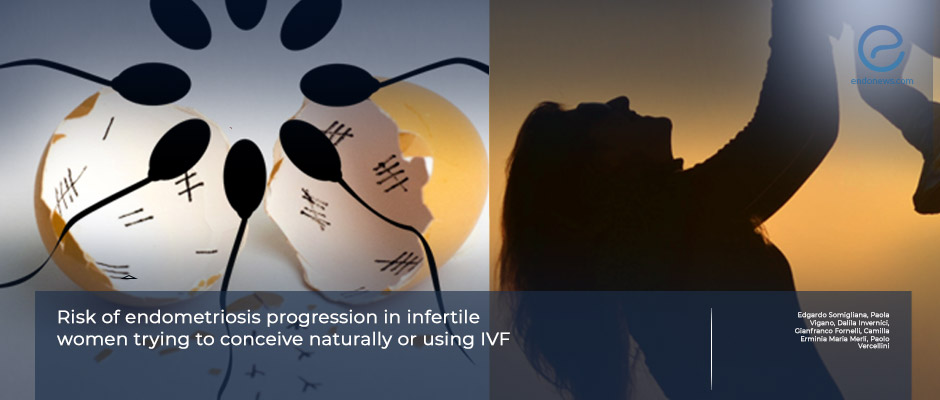Risk of endometriosis progression in infertile women trying to conceive naturally or using IVF
Sep 25, 2025
Endometriosis Progression Risk Should Guide Shared Fertility Decision-Making
Key Points
Highlights:
- Natural conception attempts may expose women to recurrence or progression risks, 10% annually.
- IVF is generally safe, but limited evidence suggests possible progression of deep invasive endometriosis with ovarian stimulation.
Importance:
- There is a complex balance between achieving pregnancy and minimizing disease progression in women with endometriosis.
- The findings highlight the urgent need for individualized fertility planning, better predictive tools for recurrence, and stronger evidence to guide ART-related decisions.
Whats's Done Here?
- This article is a narrative mini-review of evidence on the risk of recurrence or progression of endometriosis in women attempting natural conception or using assisted reproductive technology (ART), particularly IVF.
- Recurrence rates, lesion progression, impact of ovarian stimulation, pregnancy outcomes, and the role of decidualization are evaluated.
- Practical considerations are provided for physicians and patients navigating fertility and disease management.
Key Results:
- Annual recurrence/progression risk without medical therapy is approximately 10%.
- Deep infiltrating endometriosis progression is aboout 21% in untreated lesions vs 12% with medical suppression (long-term data).
- Endometrioma progression observed in ~23% over 21 months.
- IVF stimulation is generally safe; however, case reports and a cohort study suggest up to 13% risk of worsening deep bowel endometriosis requiring surgery.
- Pregnancy complications are: higher risks of placenta previa, hypertensive disorders, and rare but severe hemoperitoneum, particularly in ART pregnancies with deep lesions.
Limitations:
- Evidence remains indirect, heterogeneous, and limited—most data from observational studies, small cohorts, and case reports; no validated scoring system yet for predicting individual recurrence/progression risk; impact of ART on adenomyosis and pregnancy complications remains under-investigated.
From the Editor-in-Chief – EndoNews
"This review provides timely guidance on one of the most difficult challenges in endometriosis care: balancing fertility goals against the risk of disease recurrence and progression. The evidence suggests that recurrence risk during natural conception attempts is modest but real, while IVF is generally safe, though deep invasive endometriosis may still progress in some cases. Importantly, pregnancy itself—particularly after ART—can bring unique risks, including hemoperitoneum and decidualization-related complications.
The key message is that 'no one-size-fits-all' approach exists. Decisions on whether to pursue natural conception or assisted reproduction must be individualized, integrating fertility prognosis, disease characteristics, and patient preferences. The article highlights the urgent need for better predictive tools and high-quality prospective studies, but in the meantime, careful counseling and shared decision-making remain the cornerstone of management."
Lay Summary
Many women with endometriosis use long-term hormonal treatments to control symptoms and slow the disease, but these medications must be stopped when trying to get pregnant. This creates a dilemma: stopping treatment may increase the chance of endometriosis coming back or getting worse, but continuing treatment makes conception impossible.
This mini review, published in a recent issue of Human Reproduction by Dr. Edgardo Somigliana, Prof. Paolo Vercellini, Dr. Paola Viganò, and colleagues from Milan, Italy, explores the risks of endometriosis recurrence and progression in infertile women seeking pregnancy either naturally or through IVF.
They looked at what happens when women with endometriosis try to conceive naturally or with in vitro fertilization (IVF). The authors highlight that:
- Natural conception attempts require stopping hormonal therapy, which exposes women to about a 10% yearly risk of recurrence or progression.
-
IVF treatments are generally safe, but a small proportion of women with deep infiltrating endometriosis may experience worsening symptoms that sometimes require surgery.
- Pregnancy itself can change endometriotic lesions (sometimes mimicking malignancy on ultrasound) and is associated with a higher risk of complications such as placenta previa, preterm birth, and, rarely, internal bleeding (hemoperitoneum).
Overall, the risks are considered modest, but they are important to discuss. Each woman’s situation is unique, and the decision to try naturally or move to IVF should be personalized based on age, fertility potential, disease severity, and personal preferences. Careful counseling and shared decision-making between patients and doctors are key to balancing the desire for pregnancy with the need to minimize risks.
Research Source: https://pubmed.ncbi.nlm.nih.gov/40344687/
progression infertility hemoperitoneum recurrence IVF ART deep infiltrating endometriosis medical suppression

